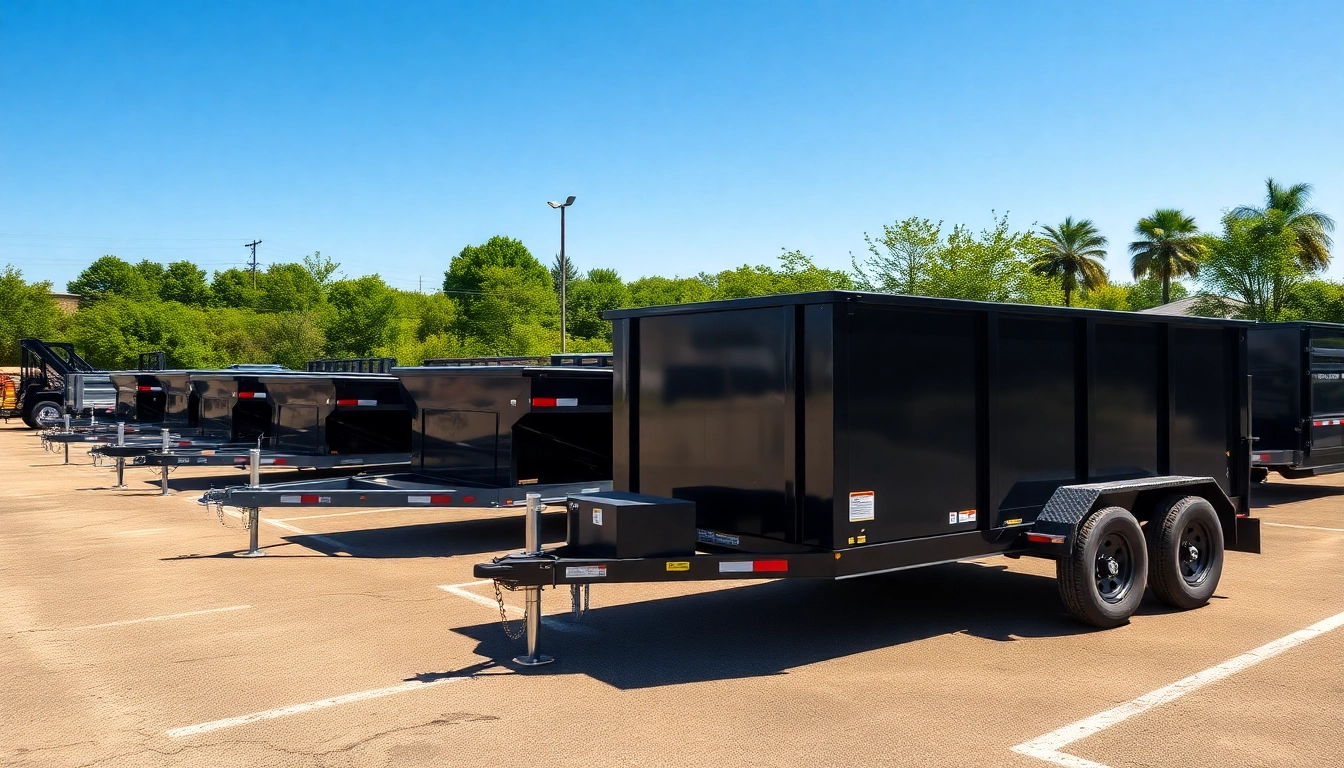Understanding Dumpster Trailers
For those in the construction or waste management industries, a dumpster trailers for sale can offer a practical solution for hauling significant loads of debris and waste. With design features that maximize efficiency, these trailers have become essential tools in various applications. In this article, we will delve into the specifics of dumpster trailers, exploring their features, benefits, and the various types available on the market, ensuring that you understand what you need to make an informed purchase.
What is a Dumpster Trailer?
A dumpster trailer, sometimes called a dump trailer, is a maneuverable towing trailer designed to transport heavy loads, especially construction debris and waste. Distinct from standard trailers, dumpster trailers feature a hydraulic lift mechanism that allows them to dump their contents easily. This feature is incredibly useful for quickly offloading materials at various sites.
Key Features to Look For
When considering a dumpster trailer, it’s crucial to understand the various features that contribute to its efficiency and usability:
- Hydraulic Lift: The heart of any dumpster trailer’s operation. A hydraulic lift allows for the easy unloading of loads, which is especially advantageous for large debris or waste materials.
- Durable Construction Materials: Look for trailers made from high-quality steel or aluminum, which can withstand rough usage and extend the trailer’s lifespan.
- Weight Capacity: Choose a trailer based on its gross vehicle weight rating (GVWR) to ensure it can handle the loads you’ll be transporting.
- Ramp Design: A well-engineered ramp can make loading and unloading easier, accommodating various types of materials.
- Braking System: A reliable braking system is crucial for safety, especially when transporting heavy loads on inclines or downhill stretches.
- Wheel Configuration: Trailers may have dual or single axle configurations, which can impact towing ease and weight distribution.
Common Uses and Applications
Dumpster trailers serve a variety of purposes across multiple industries:
- Construction: Ideal for transporting building materials, debris, and waste in both residential and commercial settings.
- Landscaping: Useful for hauling mulch, soil, and landscape debris safely and efficiently.
- Home Renovations: Homeowners can use them for ripping out old materials and transporting new ones.
- Cleanup Projects: Perfect for municipal cleanup operations or responding to natural disasters where debris needs to be removed swiftly.
- Special Events: Used to manage waste at large community events, festivals, and other gatherings.
Benefits of Owning a Dumpster Trailer
Investing in a dumpster trailer offers numerous advantages:
Cost-Effectiveness Compared to Roll-Off Dumpsters
For businesses that require frequent waste disposal, dumpster trailers can represent a significant cost-saving option over renting roll-off dumpsters on a regular basis. The upfront investment can lead to lower long-term expenses, particularly for construction companies and landscapers who often deal with debris disposal.
Ease of Use for Various Projects
With the hydraulic lift feature, disposable trailers are incredibly user-friendly, allowing operators to easily load and unload materials without needing additional machinery or crews. This efficiency translates into time and labor savings on jobs, enhancing overall productivity.
Increased Flexibility in Hauling
Unlike fixed dumpsters, dumpster trailers offer mobility that allows users to transport waste wherever it needs to go. This flexibility can be particularly beneficial for contractors who work at different sites, as the trailer can be towed directly to each location without the hassle of arranging separate disposals.
Exploring the Types of Dumpster Trailers for Sale
The market offers a variety of dumpster trailers tailored to meet specific needs. Understanding these types will help potential buyers make informed decisions:
Standard vs. Heavy-Duty Models
Standard models usually handle lighter loads and are suitable for homeowners or small-scale contractors. In contrast, heavy-duty models are designed for industrial use, catering to larger projects that demand robust construction and greater load capacities. Analyzing your unique needs is paramount when selecting between the two types.
Special Features and Customizations
Some dumpster trailers come with additional features like dual action tailgates, side doors for easier access to loaded materials, or even electric winches for added convenience. Customization options may include color choices, branding capabilities, or particular hitch styles to fit your towing vehicle.
Choosing the Right Size for Your Needs
Determining the appropriate size requires an assessment of the types of projects you undertake. Common sizes range from small, lightweight models designed for residential use to large, heavy-duty trailers that can carry tons of debris. Consider the volume of waste typical for your projects to guide your selection.
Where to Find Quality Dumpster Trailers for Sale
With various options available, it’s important to know where to look for the best dumpster trailers:
Top Retailers and Online Marketplaces
Leading retailers like Trailer Superstore, Crazy Trailer World, and Texas Pride offer extensive inventories, giving buyers the opportunity to evaluate multiple options at their convenience. Online marketplaces like Facebook Marketplace also provide a venue for purchasing used trailers, often at competitive prices. However, ensure you verify the condition and reputation of the sellers before making decisions.
Evaluating Dealers and Reviews
Before engaging with a dealer, it’s wise to read customer reviews and testimonials. Websites like Trustpilot or Better Business Bureau can give insights into the experiences of previous buyers, highlighting attributes like customer service, quality, and the overall satisfaction of dealings with the dealership.
Understanding Pricing Structures
The pricing of dumpster trailers can vary significantly based on size, manufacturer, and features. Understanding regional pricing trends can help you negotiate better, either by communicating with local dealers or browsing comparable models online to gauge a fair price range.
Maintaining Your Dumpster Trailer
Maintenance plays a critical role in ensuring the longevity and efficiency of your dumpster trailer. Here are some best practices:
Regular Maintenance Tips
Regular inspections for signs of wear and tear, such as rust or fatigue, can help prevent larger issues down the line. Additionally, checking the hydraulic system for leaks and ensuring the brakes and tires are in good condition will keep your trailer functional and safe.
Common Repairs and Issues
Common issues might include hydraulic failures, tire replacements, and general wear and tear. Having a qualified technician on hand can help with complex repairs, and knowing how to handle these issues can save both time and money. Keep an eye on important parts like the wiring, brakes, and suspension, especially after heavy use.
Maximizing Longevity and Performance
To maximize your dumpster trailer’s performance, keep it clean and dry to prevent rust. Use protective coatings if necessary and follow manufacturer recommendations for maintenance schedules. Regular cleaning prevents build-up of debris that may lead to wear on hydraulic components and structural integrity.
Conclusion
Investing in a dumpster trailer can greatly enhance the efficiency and effectiveness of waste hauling operations, offering numerous benefits over traditional alternatives. By understanding the features, types, and necessary maintenance of dumpster trailers, consumers can make informed decisions that support their business needs. Not only are these trailers versatile, but they also provide a reliable solution for transporting materials across a wide range of applications. As you search for dumpster trailers for sale, remember to evaluate your unique needs and the associated costs to find the best fit for your projects.



